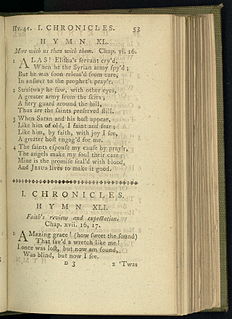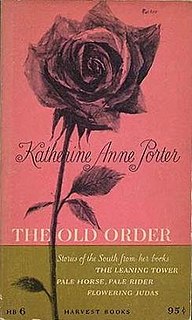
"Amazing Grace" is a Christian hymn published in 1779, with words written in 1772 by the English poet and Anglican clergyman John Newton (1725–1807).
Christianity is an Abrahamic monotheistic religion based on the life and teachings of Jesus of Nazareth. Its adherents, known as Christians, believe that Jesus is the Christ, whose coming as the messiah was prophesied in the Hebrew Bible, called the Old Testament in Christianity, and chronicled in the New Testament. It is the world's largest religion with about 2.4 billion followers.
Gospel music is a genre of Christian music. The creation, performance, significance, and even the definition of gospel music varies according to culture and social context. Gospel music is composed and performed for many purposes, including aesthetic pleasure, religious or ceremonial purposes, and as an entertainment product for the marketplace. Gospel music usually has dominant vocals with Christian lyrics. Gospel music can be traced to the early 17th century, with roots in the black oral tradition. Hymns and sacred songs were often repeated in a call and response fashion. Most of the churches relied on hand clapping and foot stomping as rhythmic accompaniment. Most of the singing was done a cappella. The first published use of the term "gospel song" probably appeared in 1874. The original gospel songs were written and composed by authors such as George F. Root, Philip Bliss, Charles H. Gabriel, William Howard Doane, and Fanny Crosby. Gospel music publishing houses emerged. The advent of radio in the 1920s greatly increased the audience for gospel music. Following World War II, gospel music moved into major auditoriums, and gospel music concerts became quite elaborate.

The Christian Methodist Episcopal (C.M.E.) Church is a historically black denomination within the broader context of Methodism. It is also occasionally considered to be a mainline denomination. The group was organized on December 16, 1870 in Jackson, Tennessee, when several black ministers, with the full support of their white sponsors in the former Methodist Episcopal Church, South, met to form an organization that would allow them to establish and maintain their own polity. They ordained their own bishops and ministers without their being officially endorsed or appointed by the white-dominated body. They called this fellowship the Colored Methodist Episcopal Church in America, which it remained until their successors adopted the current name in the 1950s.

African-American literature is the body of literature produced in the United States by writers of African descent. It begins with the works of such late 18th-century writers as Phillis Wheatley. Before the high point of slave narratives, African-American literature was dominated by autobiographical spiritual narratives. The genre known as slave narratives in the 19th century were accounts by people who had generally escaped from slavery, about their journeys to freedom and ways they claimed their lives. The Harlem Renaissance of the 1920s was a great period of flowering in literature and the arts, influenced both by writers who came North in the Great Migration and those who were immigrants from Jamaica and other Caribbean islands. African-American writers have been recognized by the highest awards, including the Nobel Prize given to Toni Morrison in 1993. Among the themes and issues explored in this literature are the role of African Americans within the larger American society, African-American culture, racism, slavery, and social equality. African-American writing has tended to incorporate oral forms, such as spirituals, sermons, gospel music, blues, or rap.
Black Hebrew Israelites are groups of Black Americans who believe that they are the descendants of the ancient Israelites. To varying degrees, Black Hebrew Israelites incorporate certain aspects of the religious beliefs and practices of both Christianity and Judaism. Many choose to identify as Hebrew Israelites or Black Hebrews rather than Jews in order to indicate their claimed historic connections.
Paranormal romance is a subgenre of both romantic fiction and speculative fiction. Paranormal romance focuses on romantic love and includes elements beyond the range of scientific explanation, blending together themes from the speculative fiction genres of fantasy, science fiction, and horror. Paranormal romance may range from traditional category romances, such as those published by Harlequin Mills & Boon, with a paranormal setting to stories where the main emphasis is on a science fiction or fantasy-based plot with a romantic subplot included. Common hallmarks are romantic relationships between humans and vampires, shapeshifters, ghosts, and other entities of a fantastic or otherworldly nature.
Urban fiction, also known as street lit or street fiction is a literary genre set in a city landscape; however, the genre is as much defined by the socio-economic realities and culture of its characters as the urban setting. The tone for urban fiction is usually dark, focusing on the underside of city living. Profanity, sex, and violence are usually explicit, with the writer not shying away from or watering-down the material. Most authors of this genre draw upon their past experiences to depict their storylines.
Inspirational fiction is a sub-category within "inspirational literature," or "inspirational writing," defined in various ways in the United States and other nations. More and more bookstores and libraries consider inspirational fiction to be a separate genre, classifying and shelving books accordingly.
A Christian novel is any novel that expounds and illustrates a Christian world view in its plot, its characters, or both, also seen in the Bible. or which deals with Christian themes in a positive way.

Christian literature is writing that deals with Christian themes and incorporates the Christian world view. This constitutes a huge body of extremely varied writing.

Parable of the Talents is a science fiction novel by American writer Octavia E. Butler, published in 1998. It is the second in a series of two, a sequel to Parable of the Sower. It won the Nebula Award for Best Novel.

The Harlem Renaissance was an intellectual, social, and artistic explosion centered in Harlem, Manhattan, New York City, spanning the 1920s. At the time, it was known as the "New Negro Movement", named after The New Negro, a 1925 anthology edited by Alain Locke. The movement also included the new African-American cultural expressions across the urban areas in the Northeast and Midwest United States affected by the Great Migration, of which Harlem was the largest.
Urban Books (Publisher) is a book publisher specializing in African-American topics, founded and published by Carl Weber in 2002.
Kendra Norman is an African-American writer of Christian fiction and non-fiction Christian literature. Her novels are known and widely applauded for their positive male lead characters and their combined romantic and suspenseful story lines.

Fantasy is a genre of speculative fiction set in a fictional universe, often inspired by real world myth and folklore. Its roots are in oral traditions, which then became fantasy literature and drama. From the twentieth century it has expanded further into various media, including film, television, graphic novels, manga and video games.
Urban/contemporary gospel is a modern form of Christian music that expresses either personal or a communal belief regarding Christian life, as well as to give a Christian alternative to mainstream secular music. Musically, it follows the trends in secular urban contemporary music.
TruthOrFiction.com is a "mythbusting" website about urban legends, Internet rumors, "erumors", e-mail forwards, and other questionable pictures or stories.

The Old Order: Stories of the South is a collection of short stories and novels by Pulitzer Prize winning American author Katherine Anne Porter. It draws stories from The Leaning Tower and Flowering Judas. It also contains Porter's short novel Old Mortality. All nine short stories and the novel take place in the American south during the late 1800s and early 1900s. The collection of stories are based largely on Porter's experience of growing up in the American south at that time. The collection, in addition to being excellent specimens of writing, offers a social critique of southern society of the time and its negative effects. These negative effects include slavery as a destructive influence on the African American race and general racial inequality, social norms hampering the discussion of "unpleasant" topics like death or sex, and the vast inequality of gender roles.







